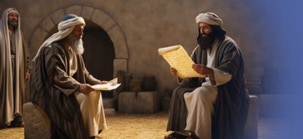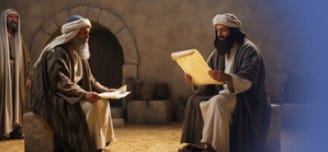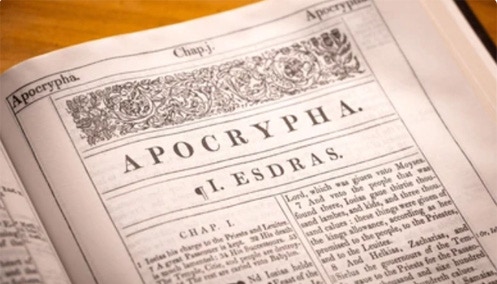


Common Objections
Common Objections
Catholic Outlook
Catholic Outlook

Catholic Outlook
Common Objections
Common Objections
__________ Recent Additions __________
Catholic Outlook
Catholic Outlook
__________ The “Apocrypha” __________
“These books teach doctrines at variance with the Bible, such as prayers for the dead; they teach immoral practices, such as lying, assassination and magic; they abound in historical and geographical inaccuracies and anachronisms.”
Gary Hoge

These are the same kind of accusations that atheists and anti-Christian skeptics make against the rest of the Bible. For example, I found the following objections at an anti-Christian website:
Protestants and Catholics both believe that the Bible is the inspired Word of God, and therefore, we believe that apparent contradictions and difficulties like those listed above can be explained. We believe this even if we don't yet know what that explanation is. Popular Protestant author Josh McDowell wrote,
One of the things for which we appeal with regard to possible contradictions is fairness. … [W]e must always begin by giving the author the benefit of the doubt. This is the rule in other literature, and we ask that it also be the rule here. We find so often that people want to employ a different set of rules when it comes to examining the Bible, and to this we immediately object. …
As historical and archaeological study proceed, new light is being shed on difficult portions of scripture and many “errors” have disappeared with the new understanding. We need a wait-and-see attitude on some problems. While all Bible difficulties and discrepancies have not yet been cleared up, it is our firm conviction that as more knowledge is gained of the Bible’s past, these problems will fade away.1
McDowell’s comments demonstrate that Protestants (like Catholics) accept the books of the Bible in spite of their apparent contradictions and discrepancies. As McDowell himself noted, “All Bible difficulties and discrepancies have not yet been cleared up.” One would expect, then, that McDowell, and other Protestants, would take the same “wait-and-see attitude” with any problems they might discover in the part of the Old Testament that they call “Apocrypha,” but for some reason, they don't. Here is Josh McDowell again:
The apocrypha contains demonstrable errors . . . Tobit was supposedly alive when Jeroboam staged his revolt in 931 B.C. and was still living at the time of the Assyrian captivity (722 B.C.), yet the Book of Tobit says he lived only 158 years (Tobit 1:3-5, 14:11).2
This demonstrates the curious double-standard that Protestants have regarding the deuterocanonical Old Testament books. If the atheists attack the book of Daniel by pointing out that Belshazzar was the son of Nabonidus (556-539 B.C), not Nebuchadnezzar (cf. Daniel 5:1-2), Protestants nevertheless maintain their “firm conviction that as more knowledge is gained of the Bible’s past, these problems will fade away.” But these very same Protestants will then turn around and attack the book of Tobit on the same basis that the atheists attacked Daniel. The Protestants will say that Tobit cannot be the Word of God because it contains historical discrepancies, just as the atheists say that Daniel can’t be the Word of God because it contains historical discrepancies.
As I said, it’s a curious double-standard. When they're defending the books they accept, Protestants are circumspect and cautious, appealing for “benefit of the doubt” and a “wait-and-see attitude,” but when the subject turns to the books they don’t accept, they sound, ironically, very much like the atheists to whom they just finished appealing for fairness. Why the inconsistency? I think the answer is simple. On a gut level, they're convinced that the deuterocanonical books don't belong in the Bible for the simple reason that they aren’t in their Bible, and they figure that if they belonged there, they’d be there.
Most Protestants (like most Catholics) don't have a clue how the various books that make up their Bible got there, but they have an implicit trust that whoever made the decision got it right. Therefore, knowing in advance that the deuterocanonical books must not be inspired, they look for reasons to reject them, just as the atheists look for reasons to reject the rest of the Bible.
What most Protestants don’t know is that the people who “made the decision” as to which books belong in the Bible did accept the deuterocanonical books. Those books have been in the Christian canon as long as there’s been a Christian canon. As the Protestant International Bible Commentary notes, “The apocryphal books were excluded from the Hebrew canon at least from A.D. 90 on, but included in the canon of the Christian church.”3 The only reason these books aren’t in Protestant Bibles is because the Protestant Reformers rejected them, in spite of the fact that they had been accepted as Scripture for centuries. As the International Bible Commentary elsewhere notes, “Protestant leaders ignored traditional acceptance of all the [deuterocanonical books] . . . and refused the status of inspiration to those books of the Vulgate not found in the Hebrew canon.”4
Having said all of this, I’d nevertheless like to address some of the objections often made against the deuterocanonical Old Testament books:
Regarding the allegation that they teach practices that are at variance with the rest of the Bible, this argument is self-defeating. If the deuterocanonical books are in fact inspired, then they are part of the Bible, and therefore cannot be at variance with it. The fact that there are apparent conflicts between some of these books and some of the other biblical books should not be surprising, because there are many similar conflicts and difficulties between the other biblical books. For example, 1 Corinthians teaches baptism for the dead (vs. 15:29), and James teaches that we are “justified by works” (vs. 2:24), in apparent conflict with Romans 3:28. (By the way, for this very reason, Martin Luther concluded that James was not inspired, though he thought it was otherwise “good to read”).
Regarding prayer for the dead, I don’t know of a single Bible verse that condemns this practice. On the contrary, the New Testament arguably contains an example of prayer for the dead. In 2 Timothy, Paul says, “May the Lord grant mercy to the household of Onesiphorus, because he often refreshed me and was not ashamed of my chains; when he arrived in Rome, he eagerly searched for me and found me.” (2 Tim. 1:16-17). It’s interesting that Paul asked for mercy for Onesiphorus’s household, but not for Onesiphorus himself. Then Paul proceeded to eulogize Onesiphorus. It seems clear that Onesiphorus was dead, and that Paul was recalling his faithful service. Then Paul says, “May the Lord grant that he will find mercy from the Lord on that day!” (2 Tim. 1:18). If, in fact, Onesiphorus was dead, this would appear to be a prayer for the repose of his soul.
Regarding the allegation that the deuterocanonical books teach immoral practices, such as lying, assassination and magic, I must again point out that this is exactly the same argument that atheists use against the rest of the Bible. They point out, for example, that the Hebrew midwives lie to Pharoah (Ex 1:19), and Jacob is rewarded for stealing Esau’s birthright (Gen. 25 and 27). Rahab lies to protect the Israelite spies (Josh. 2:4-6), and is said to be righteous before God for that very reason (James 2:25). Even God himself sends a lying spirit to deceive King Ahab (1 Kings 22:20-22). In Judges 4:17-22, Jael, the wife of Heber, assassinates Sisera, the commander of the Canaanite army, by driving a tent peg through his head while he sleeps. For this she is praised: “Most blessed of women be Jael, the wife of Heber the Kenite, most blessed of tent-dwelling women” (Judges 5:24). In Judges 11:29-40, Jephthah, filled with “the Spirit of the Lord,” vows to offer in sacrifice whatever should come out of the door of his house, if the Lord grants him victory over his enemies. The Lord does, and when Jephthah returns home, his daughter is the first thing to come out of the house. After granting her two months to weep with her friends, he sacrifices her. In 1 Samuel 28, Saul has the spirit of the prophet Samuel conjured up by magic.
In light of all this, it should be obvious that if the deuterocanonical books are to be rejected because they allegedly teach immoral things, then some of the other books of the Bible are going to have to be rejected for exactly the same reason. What’s sauce for the goose is sauce for the gander.
Regarding the allegation that the deuterocanonical books abound in historical and geographical inaccuracies and anachronisms, I must point out once again, that atheists allege the same things about some of the other Biblical books. For example, they will say that there is no historical evidence that the Medes were a world power in the period between the neo-Babylonians and the Persians (see Dan. 2:31-45, 7:1-7). They will point out that Daniel refers to Darius as “Darius the Mede,” but Darius was really king of Persia (from 522 to 486 B.C.). Also, they will point out that Belshazzar was the son of Nabonidus (556-539 B.C), not Nebuchadnezzar. As the Protestant International Bible Commentary points out,
Only those books can be judged canonical that are free from contradictions, inaccuracies, inconsistencies, peculiar practices, etc. . . . But if this criterion was (and is) used against the Apocrypha it might also have been (and was) used against the Hebrew Bible itself. Had the question of its canonicity rested purely upon standards such as this it is impossible to see how the Jews could ever have come to accept the OT books as being of divine authority.5
The allegations of historical error are usually directed against the books of Judith and Tobit (see Josh McDowell’s comment above), but both of those books are parables. They are not meant to be taken as a literal history any more than Jesus’s story of the prodigal son is meant to describe an actual family. The author of Tobit makes it very clear that his protagonist, Tobit, is fictional. He says that Tobit is the uncle of Ahiqar, who was a well-known character in ancient Semitic folklore, similar to “Aladdin” or “Paul Bunyan” in modern folklore.
Any ancient reader would know immediately that Tobit must be fictional. Likewise, the hero of the book of Judith is a fictional character named “Judith,” which means “Jewish woman.” The antagonist is “Nebuchadnezzar, who ruled over the Assyrians” (Judith 1:1). Now, everyone knows that Nebuchadnezzar ruled over the Babylonians. The author of Judith surely knew that too. This error is so obvious, that it’s too obvious. It would be like a modern author referring to “Adolf Hitler, who ruled over the Soviet Union.” This is simply the author’s hint, right in the first verse, that the story is a parable, not a historical account. The books antagonists are the greatest individual enemy of Israel, Nebuchadnezzar, and the greatest national enemy of Israel, the Assyrians.
Regarding both books, and the book of Esther, Pope John Paul II said,
The Books of Tobit, Judith, and Esther, although dealing with the history of the Chosen People, have the character of allegorical and moral narrative rather than history properly so called.6
It should be obvious that none of these arguments against the deuterocanonical books have any more merit than similar arguments against the rest of the Bible. If any of them proved that the deuterocanonical books were not inspired, they would likewise prove that a number of other biblical books were not inspired.
__________
1 Josh McDowell and Don Stewart, Answers to Tough Questions Skeptics Ask About the Christian Faith, (San Bernardino, CA: Here’s Life Publishers, Inc., 1980), 15, 17.
2 Ibid, 37-38.
3 Gerald F. Hawthorne, “Canon and Apocrypha of the Old Testament,” International Bible Commentary, ed. F.F. Bruce, (Grand Rapids, MI: Zondervan Publishing House, 1986), 34.
4 Ibid, 37, 35.
5 Ibid, 37.
6 General Audience, May 8, 1985.
Copyright © 2024 Catholicoutlook.me
MENU